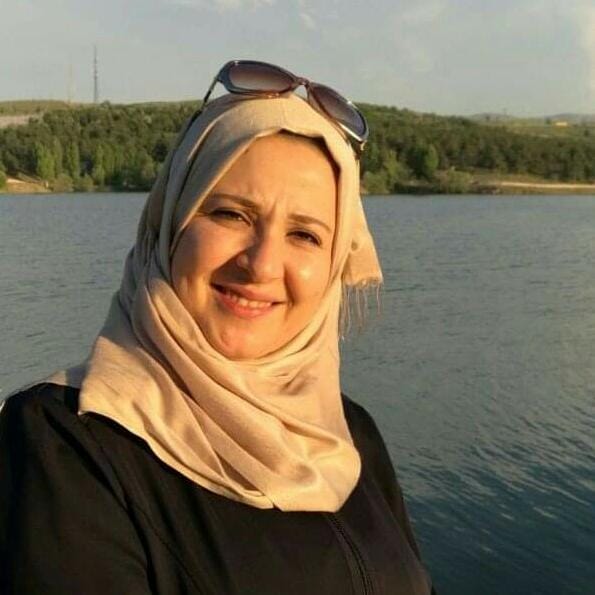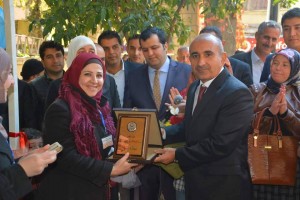
In 2018 when Najlaa el Sheikh’s 17 year old son and his friends announced their plan to join in the war against the Assad regime, his mother threatened to go with him to the war-torn Syria. “I didn’t carry him for 9 months, raise him, flee my country to bring up my son in Turkey so he could return to Syria and be killed there.” The threat was a desperate bluff but it worked. She convinced them all to go to college but realized that many other young Syrians growing as refugees in Turkey could be at risk like him.
Najlaa’s own journey began to peacebuilding began in 2012. As the Syrian regime rained barrel bombs on her hometown of Darya, Najlaa together with her son and husband fled, first to the city of Azaz in Syria and then to Turkey. In October of that year she attended ICAN’s first “What the Women Say Forum on Rights, Peace and Security” where she met women peacemakers from across the Middle East, North Africa and Asia. Their stories of activism in providing relief to survivors of war and mediating the end of violence inspired her to also act.
By 2013 Najlaa had established Kareemat (Women with Dignity) – in her small new home in the town of Kilis. Kareemat was the first organization in Turkey led by a Syrian woman to help other women refugees with literacy, economic empowerment, and psychosocial support. The support she has provided to others has also helped Najlaa cope with her own trauma from the war and being a refugee. In Kilis, Najlaa is known for her work. Her leadership and courage are also inspiring other women to speak out and prevent their sons from joining violent extremist movements.
Kareemat is among the founding members of the global Women’s Alliance for Security Leadership (WASL) led by ICAN, and Najlaa El Sheikh, speaking here to ICAN’s Rana Allam, is among the peace heroes we celebrate.
When and how did your political activity begin in Syria?
With the beginning of the Arab Spring across the Arab world in 2011, I started discussion sessions in my house. When the revolution started in Syria, I was one of the first women participating in the demonstrations that demanded freedom and then my participation focused on the women’s movement.
When and why did you decide to leave Syria?
After my husband was arrested in 2011, I was threatened with arrest. I left my house in Darya, south of Damascus, and went to my parents’ home in Aleppo. Two weeks later, my parents’ house was shelled and we had to leave for the town of Azaz, where my uncles live. After a few days, in August 2012, the Syrian regime shelled Azaz with barrel bombs and we had to flee to Turkey. I almost lost my son on that day, it was a bitter and cruel day.
What prompted you to create your organization, Kareemat? What does it do?
I had no idea or thought of creating an organization as I was a new refugee with no knowledge at all about how organizations are created, with the added issue of being in a new country and not even knowing its language. I was also suffering from trauma from the war but witnessing the great needs of women refugees made me think of providing anything to those women who became beggars or waiting in queues for aid.
I attended the ICAN forum in 2012 and learnt from other women. The ICAN team also took care of me during some of the worst times in my life. I was troubled, traumatized and tired because of everything I went through. They were the best of sisters. They encouraged me to continue working with women.
So I decided to focus on the empowerment of Syrian women refugees in all spheres of life to be able to cope with displacement and war conditions. At Kareemat we work on economic empowerment for women who are alone without their husbands or have become widows. We also provide them with psychological support, legal awareness, and have a kindergarten for the children. They are women from all the communities in Syria society – every sect and ethnic group. We’re all Syrian and we’re all women.
I used to think peacebuilding was just words said in news bulletins, a game politicians play to win elections or remain in office, but I found that our least powerful people have the biggest role in building peace.
How was the beginning of Kareemat? What difficulties and challenges did you face?

Najlaa winning award in Turkey 2015
I started Kareemat from my house with a piece of wool and two knitting needles with 18 women who were waiting in the queue to collect relief. I had no idea what to do and where to go. At the time, the idea of returning to Syria was dominant. Women started making winter clothes and I met women on Saturdays to take their finished clothes and give them new wool pieces. As time went by, I became close to them and I began to know the nature of their thinking and their needs. I started to organize group psychological support sessions and talk about pride and dignity. I reminded them that we are not here [in Turkey] to depend on anyone, that we can work and live in dignity. Meanwhile, I was exhausted from trying to find a way to sell these clothes that women make. I only had the idea to sell them on the road, but my landlord suggested that we hold an exhibition in Kilis, the city where we live. It was not easy because we needed security clearance from the authorities, and ways to organize the exhibit. But we did it. We organized it all and sold the products.
Some Turkish government officials visited us and we started the journey of establishing Kareemat more formally as it was getting bigger and bigger and could no longer be run from my home. We first grew to about 45 women, now we have hundreds coming. We became well known in the Syrian and Turkish communities.
Can you give an example of a success story for a Kareemat woman?
There are many stories. For example, one woman who used to be a beggar and now owns a sewing factory. She joined Kareemat and participated in our programs which enabled her to become a businesswoman, the owner of a small factory, and the breadwinner for her family.
There is also the story of Iman, the woman who used to live with her husband’s family and by participating in Kareemat’s programs, she became a teacher and trainer for hairdressers. Her life completely changed, and now she lives independently with her husband and children. She also has a hairdresser salon in her house.
There are many other stories, Kareemat women started with us when they had nothing, waiting in queues for relief or begging on the streets, and now they are all independent working women.
What challenges do you face?

Najlaa speaking at ICAN Forum 2017
I have faced many difficulties, one of which is that men don’t accept the work of women because of the preconceived idea that existed in Syria. They all assume that women who promote women’s rights in Syria are members of the women’s union affiliated with the Assad regime.
The second challenge is that my house was not big enough to handle the increasing number of Kareemat women.
The biggest challenge, though, is how to develop our work and secure support and funding. We have proved our merit and we have a very good reputation within the Turkish and Syrian communities, but we need the sustainability of support to continue with our programmes. ICAN is the only consistent support. They have been funding us since 2016.
How do you see the role of women in achieving peace?
Women are integral to peacebuilding. Their roles start from their families by spreading ideas that help build peace within communities. There can be no sustainable peace if women are not involved.
I will tell you a story that I personally have gone through over two years. My eldest son, 17 years old, decided to return to Syria and join the fight against the Assad regime. His friends and peers had convinced him. I felt so helpless and was overcome with fear and worry. I was in a very difficult position, he is a teenager and forcing him will not work, and at the same time, I had no experience in managing such a dialogue where I convince him.
I asked my close friends to try and talk to him and his friends, they were gentle and patient with the boys. I pretended to be strong and tough even though I would break down in tears once I was alone. In the end, he and his friends insisted on going.
When he told me his final decision, I remember feeling that my heart was being ripped from my chest but I remained strong and I said to him: Fine, I will go with you then.
I will not forget the look of my child and his friends. He yelled at me saying, “What would you do in Syria and why would you go?” I told them, “I will cook for you and take care of you. I will have nothing left in Turkey anyway of you go fight in Syria.”
They tried so hard to make me change my mind, but I remained determined and this decision made them all decide to stay in Turkey. Thank God, I was able to gently and lovingly prevent them from going to join the fighting. They all went back to their studies.
During this time, I had many discussions with the women of Kareemat, looking for advice or help from them. I remember in one of the sessions, a woman said to me, “Encourage your son to go to jihad and help him.” I couldn’t believe it, I told her, “I did not carry him 9 months, nurse him two years and raise him to be a good young man, so that he would leave me and go fight. I don’t want him to be a fighter.”
Since then I have been working with other women and mothers to help them with their sons.
I used to think peacebuilding was just words said in news bulletins, a game politicians play to win elections or remain in office, but after this story I found that even our least powerful people have a big role in building peace.
There can be no sustainable peace if women are not involved.
If you are at the table of peace negotiations in Syria, what will be the most important request?
Transitional Justice and Reparation.
Do you have a dream for the future of Syria that you want to see achieved?
I dream a lot about returning to Syria and seeing my children and their generation playing a big role in rebuilding our country after the war stopped. I dream that women are leaders and have a place in parliament and government.
I often dream the jasmine returns to Syria to decorate and perfume our streets.
